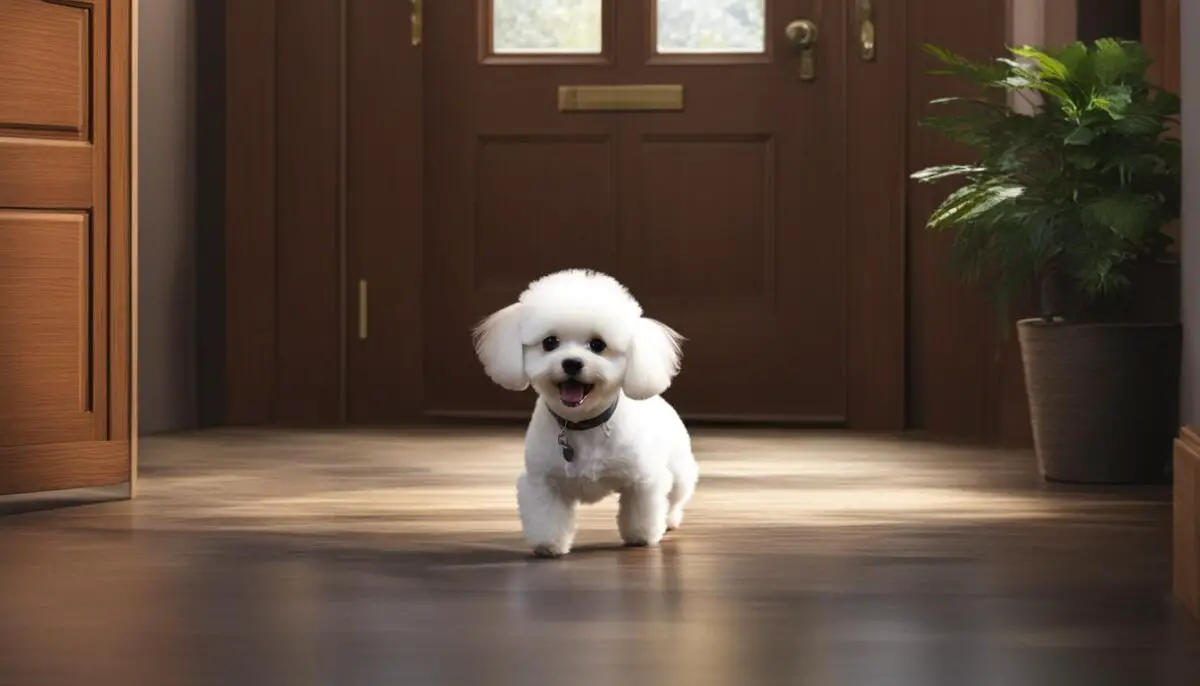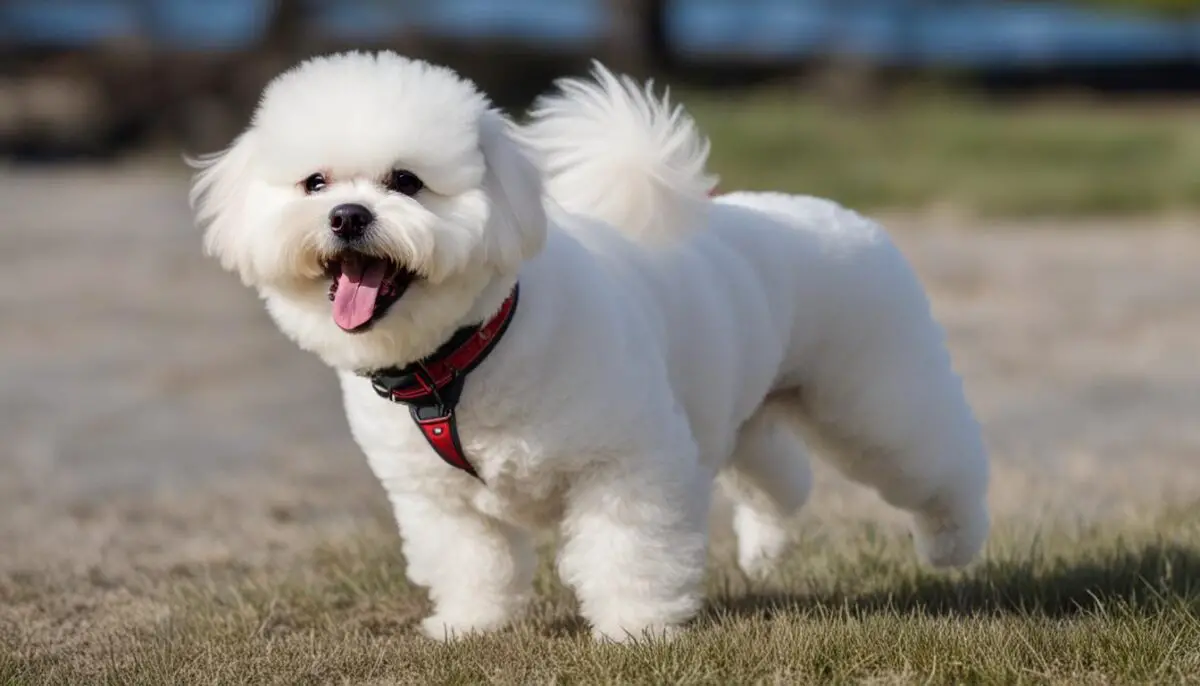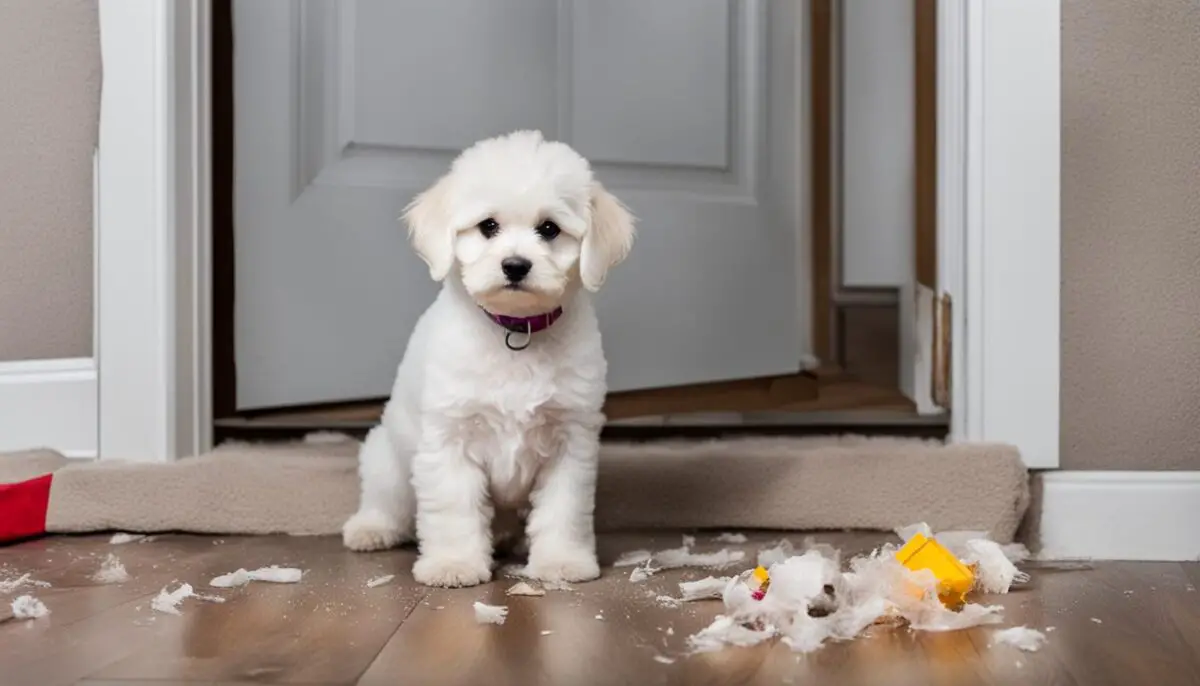Bichon Frises, with their lovable personality and playful nature, make wonderful companions. However, like any dog, they can develop behavior problems that may require attention and training. In this article, we will explore common behavior issues faced by Bichon Frises and provide solutions and tips to address them effectively.
From aggression to separation anxiety, Bichon Frises can exhibit a range of problem behaviors. By understanding these behaviors and implementing the right training techniques, you can help your furry friend lead a happier and more balanced life. Let’s dive into the world of Bichon Frise behavior problems and how to overcome them.
Key Takeaways:
- Bichon Frises can develop behavior problems that require attention and training.
- Common behavior issues in Bichon Frises include aggression, separation anxiety, and excessive barking.
- Positive reinforcement, gradual desensitization, and establishing routines can help address behavior problems.
- Understanding the typical behavior and temperament of Bichon Frises is essential in addressing their behavior issues.
- Seeking professional help may be necessary for more severe behavior problems.
Bichon Frise Behavior Problems
Understanding Bichon Frise Behavior
Bichon Frises are known for their lovable personality and distinctive behavior. Understanding their temperament and personality traits can help dog owners provide the appropriate care and training for these adorable pets.
Bichon Frises have a friendly and outgoing nature. They love human companionship and thrive in social environments. This breed is generally affectionate, playful, and eager to please their owners. Their happy-go-lucky attitude makes them great family pets.bichon frise behavior problems
However, Bichon Frises can also exhibit certain behavior issues. They are prone to separation anxiety, which means they may become anxious or distressed when left alone. Excessive barking is another common problem, especially when they feel lonely or bored. Additionally, Bichon Frises may display resource guarding behaviors, such as hoarding toys or food.
To effectively address these behavior problems, dog owners need to provide proper training, socialization, and mental stimulation for their Bichon Frises. By understanding their behavior and implementing appropriate solutions, owners can create a harmonious and balanced relationship with their furry companions.
Bichon Frise Behavior at a Glance:
- Friendly and outgoing temperament
- Love human companionship
- Potential for separation anxiety
- Prone to excessive barking
- Possible resource guarding tendencies
Separation Anxiety in Bichon Frises
Bichon Frises are known for their strong attachment to their owners, which can sometimes lead to separation anxiety. When left alone, these dogs can become distressed and exhibit behaviors such as excessive barking, destructive chewing, and even house soiling. Dealing with separation anxiety in Bichon Frises requires patience, understanding, and a consistent approach.behavior issues in bichon frise dogs
One effective strategy for addressing separation anxiety is gradual desensitization. This involves slowly exposing your Bichon Frise to being alone for short periods and gradually increasing the duration over time. Start by leaving your dog alone for just a few minutes and gradually extend the time as they become more comfortable.
Positive reinforcement is also key in managing separation anxiety. Make sure to praise and reward your dog for calm behavior when you leave and return home. You can also provide them with engaging toys or treats to keep them occupied while you’re away.bichon frise training
Establishing a routine can help alleviate separation anxiety as well. Dogs thrive on predictability, so try to create a consistent daily schedule for feeding, exercise, and alone time. This can provide a sense of security and help your Bichon Frise feel more at ease when you’re not around.
Table: Tips for Dealing with Separation Anxiety in Bichon Frises
| Tip | Description |
|---|---|
| Gradual Desensitization | Expose your Bichon Frise to being alone for short periods and slowly increase the duration over time. |
| Positive Reinforcement | Praise and reward your dog for calm behavior when leaving and returning home. Provide engaging toys or treats while you’re away. |
| Establish a Routine | Create a consistent daily schedule for feeding, exercise, and alone time to provide a sense of security. |
By implementing these strategies and being patient with your Bichon Frise, you can help alleviate separation anxiety and create a more balanced and contented dog. Remember to consult with a professional trainer or behaviorist if the problem persists or worsens.
Excessive Barking in Bichon Frises
Barking is a natural behavior for dogs, but excessive barking can become a problem for Bichon Frises and their owners. Understanding the reasons behind their barking can help address this behavior effectively.
One of the common causes of excessive barking in Bichon Frises is boredom or lack of mental stimulation. These intelligent dogs need regular exercise and mental stimulation to keep them engaged and prevent them from becoming bored. Providing them with challenging toys, interactive games, and regular playtime can help redirect their energy and reduce barking.common behavior problems in bichon frise
Another reason for excessive barking in Bichon Frises is anxiety or fear. These dogs are known for their sensitive nature and can easily feel threatened or anxious in certain situations. Socializing them from a young age and exposing them to different environments can help build their confidence and reduce anxiety-related barking.
Training and positive reinforcement techniques are essential in addressing excessive barking. Teaching your Bichon Frise the “quiet” command and rewarding them when they stop barking can be effective. It’s important to be consistent and patient during the training process.solutions for bichon frise behavior problems

Table: Tips to Stop Barking in Bichon Frises
| Tip | Description |
|---|---|
| Provide Mental Stimulation | Engage your Bichon Frise in interactive games and puzzles to keep their mind occupied and prevent boredom. |
| Socialize Your Dog | Expose your Bichon Frise to different people, animals, and environments to help them feel more comfortable and less anxious. |
| Establish a Routine | Stick to a consistent daily routine that includes regular exercise, feeding, and playtime to create a sense of structure and stability. |
| Use Positive Reinforcement | Reward your Bichon Frise with treats and praise when they exhibit calm behavior instead of barking excessively. |
| Seek Professional Help | If the excessive barking persists or becomes uncontrollable, consult a professional dog trainer or behaviorist for guidance and support. |
Remember, excessive barking can be a sign that your Bichon Frise is trying to communicate something or is experiencing discomfort. By understanding their needs, providing proper training and stimulation, and seeking professional help if needed, you can effectively reduce excessive barking and create a peaceful environment for both you and your beloved Bichon Frise.
Chewing and Digging in Bichon Frises
Chewing and digging are common behaviors exhibited by Bichon Frises. Understanding why they engage in these activities and implementing appropriate strategies can help stop these behaviors.
Chewing is a natural behavior for dogs, but when Bichon Frises chew on furniture, shoes, or other household items, it can become problematic. Providing them with appropriate chew toys and bones can redirect their chewing behavior. Additionally, ensuring they get enough physical and mental stimulation through regular exercise and interactive play can help reduce their desire to chew. bichon frise aggression
Digging is another behavior that Bichon Frises may display, often to relieve boredom or excess energy. Creating designated digging areas in the yard, filled with loose soil or sand, can help satisfy their instinct to dig. Providing mental stimulation through puzzle toys and engaging in activities that focus their energy, such as obedience training or agility exercises, can also help redirect their digging behavior.
Tips to Stop Chewing and Digging in Bichon Frises:
- Provide appropriate chew toys and bones to redirect their chewing behavior.
- Ensure they receive enough physical and mental stimulation through regular exercise and interactive play.
- Create designated digging areas in the yard to satisfy their instinct to dig.
- Engage in activities that focus their energy, such as obedience training or agility exercises.
By understanding why Bichon Frises engage in chewing and digging behaviors and implementing these tips, you can help redirect their behavior and prevent any potential damage or harm.
Aggression in Bichon Frises
Aggression can be a behavior problem in Bichon Frises that needs to be addressed to ensure the safety of both the dog and its owners. Dealing with aggression in Bichon Frises requires understanding the underlying causes and implementing appropriate training techniques.bichon frise anxiety
Aggressive behavior in Bichon Frises can manifest in various forms, including growling, biting, lunging, or resource guarding. It is essential to identify the triggers that provoke aggression and work to desensitize the dog to those stimuli. Positive reinforcement training methods, such as reward-based training and clicker training, can be effective in redirecting aggressive behaviors and promoting more desirable responses.
Seeking professional help from a certified dog trainer or animal behaviorist is highly recommended when dealing with aggression in Bichon Frises. A trained expert can assess the dog’s behavior, develop a customized behavior modification plan, and provide guidance on implementing effective strategies for managing and reducing aggression.

Table: Common Aggression Triggers in Bichon Frises
| Aggression Trigger | Description |
|---|---|
| Resource guarding | Bichon Frises may exhibit aggressive behavior when they feel threatened or protective of their food, toys, or other valuable resources. |
| Fear and anxiety | Bichon Frises that experience fear or anxiety may resort to aggression as a defensive mechanism to protect themselves from perceived threats. |
| Territoriality | Bichon Frises may display aggression when they feel their territory is being invaded or threatened by unfamiliar people or animals. |
| Lack of socialization | Bichon Frises that have not been adequately socialized with other dogs or unfamiliar situations may exhibit aggression due to fear or discomfort. |
“Addressing aggression in Bichon Frises requires patience, consistency, and a commitment to positive reinforcement training. It is important to create a safe and structured environment for the dog and seek professional guidance when necessary.”
- Identify triggers: It is crucial to determine the specific situations or stimuli that provoke aggression in the Bichon Frise. This could include resource guarding, fear, or territoriality.
- Implement desensitization techniques: Gradual exposure to the triggers in a controlled and positive manner can help the Bichon Frise become more comfortable and less reactive over time.
- Utilize positive reinforcement training: Rewarding desired behaviors with treats, praise, and play can encourage the Bichon Frise to respond positively and reduce aggressive tendencies.
- Seek professional help: Consulting with a certified dog trainer or behaviorist can provide expert guidance in addressing aggression and developing a behavior modification plan tailored to the individual dog’s needs.
Managing Fear and Anxiety in Bichon Frises
Bichon Frises, like any other dog breed, can experience fear and anxiety. It’s important for dog owners to understand these emotions and learn how to manage them effectively. Fearful behavior in Bichon Frises can manifest in various ways, including trembling, hiding, excessive panting, and trying to escape. Anxiety, on the other hand, can lead to destructive behavior, excessive barking, and even aggression. By addressing these issues, you can help your Bichon Frise feel more secure and calm.
To manage fear and anxiety in Bichon Frises, gradual desensitization is key. This involves exposing your dog to the source of their fear or anxiety in a controlled and gradual manner. For example, if your Bichon Frise is afraid of loud noises, you can start by playing a recording of the noise at a low volume and gradually increase it over time. Pairing these exposures with positive reinforcement, such as treats or praise, can help your dog associate the previously fearful stimuli with something positive.bichon frise separation anxiety.
Creating a calm and secure environment for your Bichon Frise is also essential in managing fear and anxiety. Providing a designated safe space, such as a crate or a specific room, can give your dog a sense of security. Additionally, implementing a consistent routine and maintaining a calm demeanor yourself can help to reduce your dog’s anxiety levels. Dogs are highly attuned to their owners’ emotions, so staying calm and relaxed can have a positive impact on your Bichon Frise’s behavior.
| Managing Fear and Anxiety in Bichon Frises | Tips for Managing Fear and Anxiety |
|---|---|
| Gradual Desensitization | Expose your dog to the source of fear or anxiety in a controlled and gradual manner, paired with positive reinforcement. |
| Create a Calm Environment | Provide a designated safe space and maintain a consistent routine to help your dog feel secure and reduce anxiety. |
Overall, managing fear and anxiety in Bichon Frises requires patience, consistency, and understanding. By implementing these strategies, you can help your Bichon Frise feel more comfortable and confident in various situations.
Housebreaking Issues in Bichon Frises
Housebreaking can be a common challenge when it comes to Bichon Frises. These adorable dogs may struggle with potty training, causing frustration for both owners and pets. However, with patience, consistency, and the right training techniques, you can overcome housebreaking issues and establish a successful routine for your Bichon Frise.
One of the key factors in tackling housebreaking problems is consistency. Establish a regular schedule for potty breaks and stick to it. Take your Bichon Frise outside to their designated potty area at the same times each day, such as after meals, naps, or play sessions. Using verbal cues, such as “go potty,” can also help reinforce the desired behavior.
Positive reinforcement is another essential element in housebreaking Bichon Frises. When your dog successfully goes potty outside, praise and reward them with treats or verbal praise. This positive reinforcement will help them associate going potty in the appropriate place with a positive experience. Conversely, avoid scolding or punishing your Bichon Frise for accidents indoors, as this can create fear or anxiety around potty training.
| Common Housebreaking Issues | Solutions |
|---|---|
| Accidents indoors | Supervise your Bichon Frise closely indoors, and take them outside frequently to prevent accidents. Use crate training or confine them to a designated area when you cannot supervise them. |
| Difficulty understanding where to go potty | Designate a specific area outside for your Bichon Frise to go potty. Use verbal cues and reward them when they go in the designated spot. Avoid using pee pads indoors, as this can confuse the training process. |
| Inconsistent schedule | Create a consistent schedule for potty breaks and stick to it. Take your Bichon Frise outside at the same times each day to establish a routine. |
Accidents can happen during the housebreaking process, but it’s important to remain patient and persistent. Consistent training, positive reinforcement, and a structured routine will help your Bichon Frise understand where they should go potty and establish good habits. With time and dedication, you can successfully overcome housebreaking issues and enjoy a clean and well-trained Bichon Frise.

Solutions for Separation Anxiety in Bichon Frises
Bichon Frises are known for their affectionate nature and strong attachment to their owners. However, this deep bond can sometimes lead to separation anxiety when they are left alone. If your Bichon Frise exhibits signs of distress or engages in destructive behaviors when you’re not around, there are several solutions you can try to help alleviate their separation anxiety.
Establish a Gradual Desensitization Routine
One effective approach to address separation anxiety in Bichon Frises is gradual desensitization. Start by leaving your pet alone for short periods and gradually increase the duration over time. During these practice sessions, create a calm and soothing environment by playing soft music or leaving a comforting item, like a piece of clothing with your scent, in their sleeping area. This gradual exposure to being alone will help your Bichon Frise build confidence and reduce their anxiety.
Provide Toys and Treats for Mental Stimulation
Boredom can exacerbate separation anxiety, so it’s crucial to keep your Bichon Frise mentally stimulated when you’re away. Provide interactive toys or treat-dispensing puzzles that will engage their minds and keep them occupied. Frozen treats, such as peanut butter-stuffed Kongs, can also be helpful in diverting their attention and providing a positive association with being alone.
“Gradual desensitization and positive reinforcement are key strategies for addressing separation anxiety in Bichon Frises.”
Consider Crate Training and Medication
Crate training can provide a sense of security for your Bichon Frise while you’re away. Make the crate comfortable and inviting with cozy bedding and their favorite toys. However, it’s essential to introduce crate training gradually and ensure that your pet associates it with positive experiences. Consult with a veterinarian or a professional dog trainer if you’re considering medication options to help manage your Bichon Frise’s separation anxiety. They can provide guidance and recommend appropriate medications if necessary.
Remember, every Bichon Frise is unique, and what works for one dog may not work for another. It’s essential to be patient, consistent, and understanding throughout the process of addressing separation anxiety. With time, positive reinforcement, and the right strategies, you can help your Bichon Frise feel more comfortable and secure when you’re not around.
| Solutions for Separation Anxiety in Bichon Frises | Benefits |
|---|---|
| Gradual desensitization | Builds confidence and reduces anxiety |
| Toys and treats for mental stimulation | Keeps the mind engaged and diverts attention |
| Crate training | Provides a secure and comfortable space |
| Medication (if necessary) | Assists in managing severe separation anxiety |

Tips to Reduce Excessive Barking in Bichon Frises
Bichon Frises are known for their vocal nature, but excessive barking can be a problem that can disrupt your household and annoy your neighbors. Understanding the reasons behind your Bichon Frise’s barking and implementing effective strategies can help you reduce this behavior. Here are some tips to curb excessive barking in Bichon Frises:
Create a Quiet Environment
Identify triggers that cause your Bichon Frise to bark excessively and make changes to eliminate or minimize them. For example, if they tend to bark at people passing by the window, consider closing the curtains or using window film to block their view. Creating a calm and quiet environment can help reduce their urge to bark.
Provide Mental Stimulation
Boredom can often lead to excessive barking in Bichon Frises. Make sure your furry friend has plenty of mental stimulation through interactive toys, puzzle games, and regular exercise. A tired and engaged Bichon Frise is less likely to engage in excessive barking.
Use Positive Reinforcement Training
Train your Bichon Frise to bark on command and to be quiet on command using positive reinforcement techniques. Reward them with treats and praise when they bark on command and withhold rewards when they bark excessively. Consistency and patience are key when using this training method.
| Barking Trigger | Strategy |
|---|---|
| Doorbell ringing | Teach your Bichon Frise to go to a designated spot and stay quiet when the doorbell rings. |
| Other dogs barking | Redirect their attention to a toy or engage them in an alternative activity when they react to other dogs barking. |
| Attention-seeking barking | Ignore their barking and reward calm behavior to discourage attention-seeking barking. |
| Separation anxiety-related barking | Address separation anxiety through gradual desensitization techniques and seek professional help if needed. |
Remember, excessive barking can be a symptom of underlying issues, such as anxiety or fear. If your Bichon Frise’s barking persists despite your efforts, it’s important to consult with a professional trainer or veterinarian for further guidance.
Managing Chewing and Digging in Bichon Frises
The Bichon Frise breed is known to have a tendency for chewing and digging behaviors. These behaviors can be destructive and frustrating for owners, but with the right approach, they can be managed effectively. By understanding the underlying causes and implementing appropriate strategies, you can help curb these behaviors and promote a harmonious environment for both you and your furry friend.
Understanding the Reasons Behind Chewing and Digging
Bichon Frises may engage in chewing and digging due to various reasons such as boredom, anxiety, teething, or lack of exercise. It is important to identify the root cause of these behaviors to address them effectively. If your Bichon Frise is chewing or digging excessively, observe their behavior and try to determine any triggers or patterns.
Providing Appropriate Outlets for Chewing and Digging
To redirect your Bichon Frise’s chewing and digging tendencies, it is essential to provide them with appropriate outlets. Offer a variety of chew toys made specifically for dogs, such as durable rubber toys or dental chews. Providing interactive toys can help stimulate their minds and keep them engaged, reducing the likelihood of destructive chewing or digging.
Encouraging Exercise and Mental Stimulation
Regular exercise and mental stimulation are crucial for a well-behaved Bichon Frise. Engage in daily walks, play fetch, or participate in interactive games that challenge their minds. A tired Bichon Frise is less likely to engage in destructive behaviors, as they will be more focused on resting and relaxing.
By understanding the reasons behind chewing and digging, providing appropriate outlets, and ensuring your Bichon Frise receives adequate exercise and mental stimulation, you can effectively manage these behaviors. Remember to be patient, consistent, and offer positive reinforcement when your Bichon Frise exhibits appropriate chewing and digging habits.

Tips to Manage Chewing and Digging in Bichon Frises
- Monitor your Bichon Frise’s behavior closely and identify any triggers or patterns.
- Provide a variety of appropriate chew toys to redirect their chewing behavior.
- Engage in daily exercise and interactive games to keep your Bichon Frise mentally stimulated.
- Establish a consistent routine to help your Bichon Frise feel secure and reduce anxiety.
- Consider using deterrent sprays or bitter-tasting substances on objects you want to protect from chewing.
- Seek professional help, such as a certified dog trainer or behaviorist, if the chewing and digging behaviors persist despite your efforts.
Remember, managing chewing and digging behaviors requires patience, consistency, and understanding. With time and effort, you can help your Bichon Frise develop appropriate habits and maintain a happy and healthy relationship.
Conclusion
In conclusion, understanding and addressing behavior problems in Bichon Frises is essential for a harmonious relationship with these lovable dogs. By implementing the solutions and tips discussed in this article, you can effectively manage common behavior issues and create a happy environment for both you and your Bichon Frise.
Training and consistency are key when it comes to resolving behavior problems. Whether it’s separation anxiety, excessive barking, chewing and digging, aggression, fear and anxiety, or housebreaking issues, positive reinforcement and gradual desensitization techniques can make a significant difference.
Remember, Bichon Frises are social and loving companions who thrive on human affection. By providing them with mental stimulation, exercise, appropriate outlets for their energy, and a calm environment, you can help prevent and address behavior problems. With patience and understanding, you can ensure a happy and fulfilling life for your Bichon Frise.
FAQ
What are the common behavior problems faced by Bichon Frises?
Bichon Frises can develop separation anxiety, excessive barking, resource guarding, destructive chewing, digging, aggression, fear, anxiety, and housebreaking issues.
How can separation anxiety be addressed in Bichon Frises?
Separation anxiety in Bichon Frises can be alleviated through gradual desensitization, positive reinforcement, and establishing a routine.
What can be done to reduce excessive barking in Bichon Frises?
Identifying the cause of barking and providing mental stimulation are effective ways to reduce excessive barking in Bichon Frises.
How can chewing and digging be managed in Bichon Frises?
Providing appropriate toys, exercise, and redirecting their behavior are key strategies for managing chewing and digging in Bichon Frises.
What are the solutions for aggression in Bichon Frises?
Positive reinforcement training, identifying triggers, and seeking professional help can help address aggressive behavior in Bichon Frises.
How can fear and anxiety be managed in Bichon Frises?
Gradual desensitization, positive reinforcement, and providing a calm environment can help Bichon Frises overcome fear and anxiety.
What can be done to address housebreaking issues in Bichon Frises?
Consistency, frequent potty breaks, and positive reinforcement training can help address housebreaking issues in Bichon Frises.
What are the solutions for separation anxiety in Bichon Frises?
Gradual desensitization, providing toys and treats, crate training, and medication can be effective solutions for addressing separation anxiety in Bichon Frises.
What are some tips for reducing excessive barking in Bichon Frises?
Identifying triggers, providing mental stimulation, and using training exercises are some effective tips for reducing excessive barking in Bichon Frises.
How can chewing and digging be stopped in Bichon Frises?
Providing appropriate toys, exercise, and redirecting their behavior are key strategies for managing chewing and digging in Bichon Frises.
How can aggression in Bichon Frises be dealt with?
Positive reinforcement training, identifying triggers, and seeking professional help can help address aggressive behavior in Bichon Frises.
What can be done to manage fear and anxiety in Bichon Frises?
Gradual desensitization, positive reinforcement, and providing a calm environment can help Bichon Frises overcome fear and anxiety.
How can housebreaking issues be addressed in Bichon Frises?
Consistency, frequent potty breaks, and positive reinforcement training can help address housebreaking issues in Bichon Frises.
